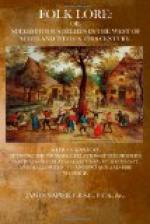It was an old superstition that the body of a murdered person would bleed on the presence or touch of the murderer. We find this belief mentioned as far back as the eleventh century. In an old ballad of that period occurs the following passage:—
“A marvel high and strange
is seen full many a time—
When to the murdered body
nigh the man that did the crime,
Afresh the wounds will bleed.
The marvel now was found—
That Hagan felled the champion
with treason to the ground.”
Several centuries after this, we find it mentioned in another ballad, entitled “Young Huntin":—
“O white were his wounds washen,
As white as a
linen clout,
But when Lady Maisry she cam’
near,
His wounds they
gushed out.”
The reason for this marvel was ascribed by the Rev. Mr. Wodrow, to the wonderful providence of God, who had said, “thou shalt not suffer a murderer to live,” and had, in order that the command might be justly carried out, provided the means whereby murderers might be readily detected. This superstition certainly survived within this century, and I have heard many instances adduced to prove the truth of bleeding taking place on the introduction of the murderer.
Another curious form of belief was prevalent among some persons, that the body of a suicide would not decay until the time arrived when, in the ordinary course of nature, he would have died. This was founded upon another belief, that there is a day of death appointed for every man, which no one can pass; but as man is possessed of a free will, he may, by his own wicked determination, shorten the union of his soul and body, but that there his power ends: he cannot in reality kill either soul or body, for were he to possess this power, he would possess the power to alter the decrees of God, which is a power impossible for man to possess. This was a mad, not deep, sort of metaphysics; but there was sufficient method in its madness to cause it to gain the suffrages of a large number of people. It was affirmed that those who had examined into the matter had found that the bodies of suicides were mysteriously preserved from decomposition until the day arrived on which they would naturally—that is, according to God’s decree—have died. About the year 1834, I was taking a walk along the banks of the canal north of Glasgow, and sat down beside a group of well-dressed men, who were conversing on general topics, and amongst other things touched on the matter of suicides—proximity to the canal probably suggested the subject. One of the group pointed out a quiet spot where he affirmed that Bob Dragon, an old Glasgow celebrity, had been buried. Bob, he said, had committed suicide; but his relations being aware that, in consequence of this act, his property, according to law, became forfeited to the Crown, had him buried secretly in this out-of-the-way spot, and obtained another corpse,




